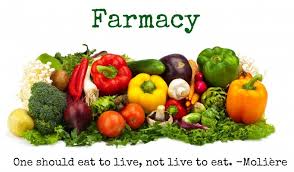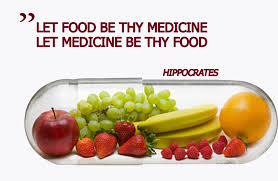We live in a fast, modern society. Just look how much as changed and improved over a decade or two. I can remember having to type in the DOS prompt commands on our Commodore 64 to tell my computer what I wanted it to do, now I click on a little icon and “poof” a calendar pops up. Along with these improvements come expectations for speed and efficiency.

The same expectations are applied to our thoughts on medicine. We want fast results, and if we don’t get them we tend to immediately dispel whatever we’re taking as useless. This especially applies to our nutrition in regards to our health. For some reason the latest, most expensive drug that only treats symptoms is relished over buying organic whole foods due to organics costing to much. A $6.00 fast food “value” meal is way more expensive than a $9.00 organic salad with chicken on it. “Wait, did I read that right. This guy clearly doesn’t know numbers.” The reason it’s cheaper is because in the long run you’re going to be paying so much more in medical care expenses from eating unhealthy ‘cheaper’ foods than if you ate healthy and used your food as medicine.
In this article I picked a couple common conditions that I’m going to highlight research, cases, and evidence supporting how food can address these conditions, relieve symptoms and even prevent diseases. Be sure to consult anything below with your doctor.
Type 2 Diabetes
Diabetes is one of the fastest growing conditions in America, and throughout the world. A couple years ago I was studying public health and infectious disease in Tanzania, on the east coast of Africa. I learned Type 2 Diabetes (T2D) and obesity was becoming more prevalent in third world countries. Why is a disease that’s usually attributed to an excess of food occurring so much in a place where food is scarce? It’s because it’s more about which foods are eaten and how much these certain foods are eaten. I could easily write this entire article food and diabetes, but then you’d miss out on a lot of other cool info!

Although T2D cases continues to rise, it’s actually been known for quite a long time how to prevent and reverse the disease. And it all starts with food.
In 2002 the Diabetes Prevention Program Research Group tested 3,234 pre-diabetics to see what effect diet and exercise had compared to Metformin (a drug that lowers the body’s glucose production). Those that changed their diet and exercise lost more weight and had a lower rate of developing diabetes than those on Metformin. Multiple studies have shown that decreasing sugar and refined carbohydrates prevents and can lower a person’s blood sugar to normal levels even after they’ve been diagnosed with diabetes. It’s all about what, when, and how you choose to eat.
Cinnamon has been shown to lower blood sugar levels in T2D, depending on the dosage and duration it’s taken. A study showed that taking 1 gram, less than ½ a teaspoon, for 40 days improved blood sugar, cholesterol, and triglyceride levels by 20%.
If we’re looking at medicine for T2D, we want to find something that will normalize a person’s blood sugar and there’s been no better track record then doing that than with food.
Heart Disease
The most common cause of death in America is Heart Disease, and it’s also one of the most treatable, preventable conditions that can be addressed through our diet. Diets contributing to heart disease and preventing heart disease are one of the most controversial and confusing issues in healthcare. One nutrient that has gotten a bad rap over many years is dietary fat. Researchers compared 21 different studies that measured if decreasing saturated fat would decrease the risk of heart disease, such as having a stroke or developing coronary artery disease. The results of the analysis showed no significant association between high intake of saturated fatty acids and an increased risk of coronary heart disease, stroke or cardiovascular disease.

The PREDIMED study was a landmark study on diet and heart disease. The study had 77,447 persons at high risk for cardiovascular disease assigned to 3 different groups. Two of the groups ate a variety of the Mediterranean Diet, a diet high in healthy fats from extra virgin olive oil and nuts. The other group was advised to decrease dietary fat intake. The researchers noticed a 30% reduction in the risk of cardiovascular disease. There was such a difference between the Mediterranean Diet group and control group that the trial had be stopped, since it could be unethical to keep exposing one group to such a healthy diet and the other group to one that could make them worse (the low-fat group).
Another interesting study was done by Eric Westman from the Lifestyle Medicine Clinic at Duke University Medical Center. He had 50 patients eat meat and leafy green vegetables for 6 months. The results: improved cholesterol levels and they lost weight.
There are also a multitude of studies demonstrating how a lower carbohydrate diet can result in decreasing the risk or heart disease by improving risk factors related to heart disease, such as LDL and HDL cholesterol, blood sugar levels, and other lab results.
One great food choice for your heart are beans, the darker the better. Beans are high in folate. Folate converts homocysteine, an inflammatory heart diseases risk factor, into a compound called methionine, which is a compound that doesn’t damage our arteries.
The above two conditions are just a glimpse of some of the research out there in preventing and treating diseases with nutrition, and is not nearly an exhaustive example. Each year there are thousands of research papers published on nutrition, and it is up to medical professionals and medical researchers like myself, to interpret the data and apply it clinically. Nutrition can address a wide variety of conditions other then above mentioned, such as prevention and treatment of arthritis, cancer, obesity, skin, neurological, conditions, and many more. I emphasize discussing nutrition and/or taking supplements with your healthcare expert such as a Naturopathic Doctor, this can help your health as well as your pocketbook.
By Travis Whitney, NMD, MSc
References
Appel, L.J., and Van Horn, L. Did the PREDIMED Trial Test a Mediterranean Diet? N Engl J Med 2013; 368:1353-1354.
Diabetes Prevention Program Group. Reduction in the Incidence of Type 2 Diabetes with Lifestyle Intervention or Metformin. New England Journal of Medicine 2002; 346:393–403.
Duke JA. The Green Pharmacy Guide To Healing Foods. New York, NY: Rodale; 2008.
Estruch R, et al. Primary Prevention of Cardiovascular Disease with a Mediterranean Diet. N Engl J Med 2013; 368:1279-1290.
Siri-Tarino PW, Sun Q et al.”Meta-analysis of prospective cohort studies evaluating the association of saturated fat with cardiovascular disease.” Am J Clin Nutr. 2010; doi: 10.3945/ajcn.2009.27725.
Taubes, G. Why We Get Fat and What to Do about It. Alfred Knopf: 2011.




